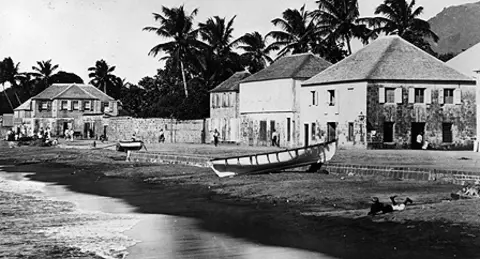A chronology of key events:
1493 – Christopher Columbus lands on the islands and names St Kitts after his patron saint, Christopher.
 Getty Images
Getty Images
St Kitts, pictured in the 1920s, was a major producer of suger until 2005
1623 – The British establish their first Caribbean colony on St Kitts.
1626 – The British massacre 2,000 indigenous Caribs.
1628 – The British establish a colony on Nevis.
1783 – France relinquishes claims on St Kitts in the Treaty of Versailles.
1871 – St Kitts, Nevis and Anguilla united as a British dependency.
1932 – Centre-Left Labour Party founded to campaign for independence.
Self-government
1967 – St Kitts, Nevis and Anguilla become an internally self-governing member of the West Indies Associated States with Labour Party leader Robert Bradshaw as prime minister.
1970 – Nevis Reformation Party founded, campaigns for independence.
1971 – Anguilla placed under direct British rule following a rebellion against domination by St Kitts.
1980 – Anguilla granted a constitution and its union with St Kitts and Nevis formally revoked.
Independence
1983 – St Kitts and Nevis jointly attain independence within the British Commonwealth with Kennedy Simmonds as prime minister.
1993 – Anti-government demonstrations take place following an inconclusive general election.
1994 – A state of emergency is declared after anti-government riots by Labour Party supporters in the capital, Basseterre.
1995 – Prime Minister Kennedy Simmonds loses in a general election which he had called following a scandal involving allegations of drug smuggling; Labour Party leader Denzil Douglas becomes prime minister.
Secessionist threat
1997 – Nevis legislators authorise a referendum on the issue of whether the island should secede from St Kitts.
1998 July – St Kitts and Nevis carries out its first execution in 17 years despite international protests.
1998 August – Referendum on Nevis independence fails to achieve the two-thirds majority required for the island to secede.
1998 September – Hurricane George strikes.
2000 – Denzil Douglas begins a second term as prime minister after his Labour Party wins a majority of seats in a general election.
2003 March – Largest hotel complex in the eastern Caribbean opens on Frigate Bay, St Kitts.
2004 October – Denzil Douglas begins a third consecutive term as prime minister.
2005 March – Government decides to close the 300-year-old, loss-making sugar industry after the 2005 harvest.
2008 December – First execution in over a decade when Charles Elroy Laplace was hanged for murder. Government said it hoped this would serve as a deterrent against high levels of violent crime.
2010 January – Denzil Douglas wins a fourth consecutive term as premier.
2012 May – Paris Club of creditor governments agrees to restructure St Kitts and Nevis’ public debt, cutting interest payments by 90%.
2014 May – The US Treasury warns that “illicit actors” are abusing a scheme offering fast-track St Kitts and Nevis citizenship in return for investing in the country.
2015 February – The Team Unity coalition wins elections, ending the former ruling Saint Kitts and Nevis Labour Party’s 20-year reign.
2022 August – Terrance Drew elected as prime minister after his St Kitts and Nevis Labour Party wins the general election.
Source link : http://www.bing.com/news/apiclick.aspx?ref=FexRss&aid=&tid=66e442604a0f416993f6486126562e0b&url=https%3A%2F%2Fwww.bbc.com%2Fnews%2Fworld-latin-america-63134338&c=2691364400622324264&mkt=en-us
Author :
Publish date : 2022-10-03 13:00:00
Copyright for syndicated content belongs to the linked Source.





